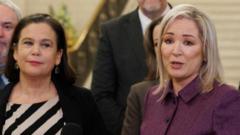The boycott aligns with increasing pressure from various political factions, particularly following the Social Democratic and Labour Party (SDLP)'s declaration of their own intent to abstain unless changes occur in U.S. foreign policy. McDonald cited her "horror" over Trump's stance, which contradicted the values of peace and security, urging Irish leaders to advocate for Palestinian rights during this diplomatic showcase.
The announcement comes amidst deepening tensions and evolving dynamics within U.S.-Irish relations, highlighting the intersection of cultural traditions and pressing global humanitarian issues. As the date approaches, the ramifications of this decision may reverberate through the political landscape, reflecting a shift in how Irish and Northern Irish representatives engage with global partners amidst controversial geopolitical events.
The announcement comes amidst deepening tensions and evolving dynamics within U.S.-Irish relations, highlighting the intersection of cultural traditions and pressing global humanitarian issues. As the date approaches, the ramifications of this decision may reverberate through the political landscape, reflecting a shift in how Irish and Northern Irish representatives engage with global partners amidst controversial geopolitical events.





















